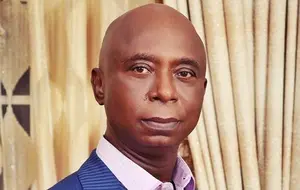Senator Ned Nwoko Alleges Military's Destruction of Evidence in Illegal Oil Cases Revealing Complicity
Senator Ned Nwoko voices serious apprehensions about the military's practice of destroying evidence pertaining to seized vessels involved in illegal oil activities. He suggests a network of involvement by multiple stakeholders and questions the integrity of the process, hinting at potential collusion and systemic issues within the industry.
Senator Nwoko Questions Military's Handling of Seized Vessels in Oil Theft Cases.

Sen. Ned Nwoko, the Vice Chairman of the Senate Committee on Environment and member of the Senate Committee on Upstream Petroleum, expressed grave concerns regarding the military's approach to seized vessels involved in illegal activities, particularly the destruction of evidence. Speaking to the News Agency of Nigeria (NAN) in Abuja, Nwoko strongly criticized the military's practice of destroying vessels apprehended for carrying illicit goods and stolen crude oil.
In his statement, Nwoko emphasized the inherent flaw in destroying crucial evidence pertinent to crimes committed. He compared it to seizing stolen goods, advocating for proper documentation, preservation, and the subsequent legal charging of the offenders. He emphasized the necessity of presenting the seized products as evidence in a court of law before eventually returning them to their rightful owners.
Expressing suspicion and deep concern, Nwoko highlighted the apparent complicity within the military's actions, suggesting that the destruction of evidence might indicate a compromised system. He alleged potential collusion among those responsible for the transportation and loading of the stolen crude oil, hinting at a complex network involving oil companies, production entities, NNPC officials, and even law enforcement agencies like the police.
The senator raised valid points regarding the time-consuming nature of loading vessels with crude oil, indicating a prolonged process that would likely involve various key players and official platforms. He hinted at a systemic failure involving multiple stakeholders, implying that the issue of illicit oil trade might involve a network of individuals across different sectors, rather than being isolated incidents.
Nwoko's concerns highlight the complexities and potential corruption within the chain of custody and the handling of evidence, questioning the integrity of the process concerning seized vessels involved in illegal oil activities. His statements underscore the need for a comprehensive and accountable approach to tackle such illicit practices within the oil industry.



